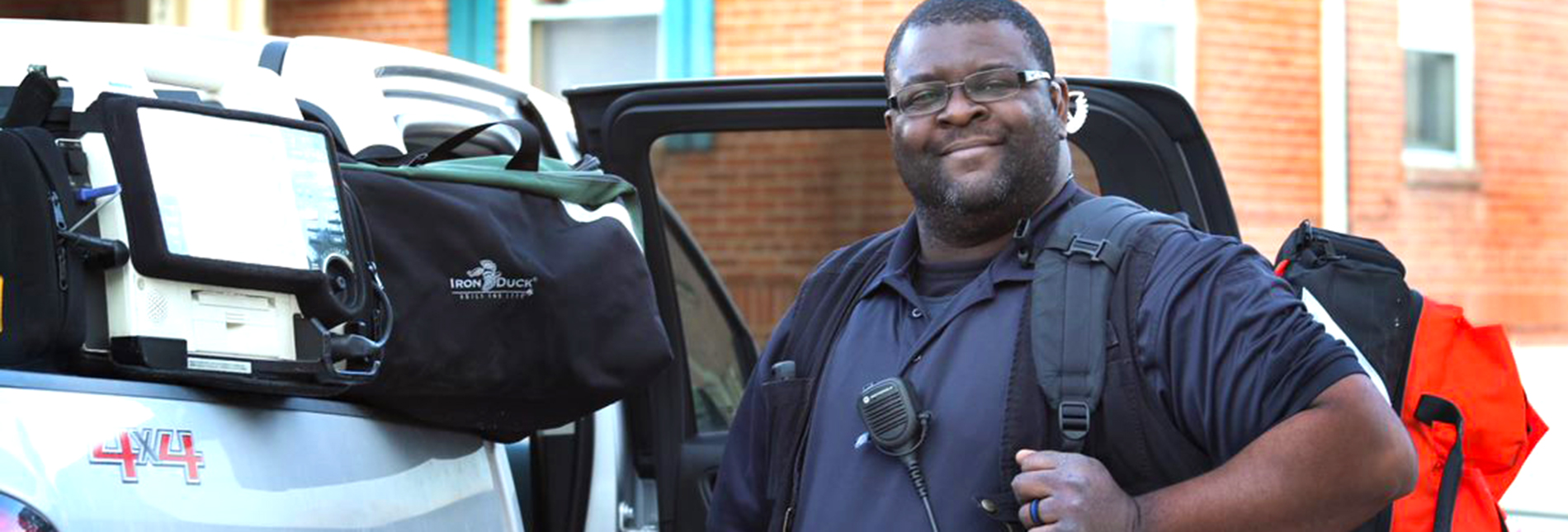Amber McDonald, PhD, LCSW, an assistant professor in the Department of Psychiatry at the University of Colorado School of Medicine, has been on the forefront of public safety’s cultural shift for years. She’s helped steer policing from a confrontational, “we’re taking you in” approach toward a more nuanced style such as: “We want to hear you out and connect you to community resources.”
McDonald, who is deputy director of the START Center, serves as clinical supervisor for Longmont’s Crisis Outreach and Engagement (CORE) program.
The innovative co-response team in the Department of Public Safety is growing and showing promising results, especially during a pandemic that has spurred mental health problems coupled with greater barriers to service. Some Longmont officials credit the CORE program, in its fifth year and soon to add a fourth on-the-ground team, for a 50% decline in suicides.
How CORE works
CORE sends a team of three – a behavioral-health expert, a police officer and a paramedic – to each call. The goal is to de-escalate and problem-solve the incident rather than assign hasty judgment and simply process the call.
McDonald offers valuable clinical oversight, and as a former social worker and current scholar, she also brings a passion for research. She received a $20,000 community engagement program grant from the Colorado Clinical and Translational Sciences Institute to conduct an in-depth study into CORE’s effectiveness.
The several-month, mixed-methods study collected quantitative data from police officers – assessing their perspectives on the acceptability of the program – and qualitative data from the community members receiving service from CORE. McDonald’s team asked those who’d been contacted by CORE three questions:
- Did you believe CORE was there to help you as opposed to impose punitive means?
- Was CORE helpful? Did the team offer helpful resources and work to solve your problem?
- Was the team’s follow-up appropriate?
“We’re trying to figure out what components of (co-response) models work, how do we keep them sustainable, and how do we replicate them in other communities?” McDonald said, noting that the nearly completed study will be submitted to academic journals and summarized in data sheets and reports for city stakeholders. “This (empirical study into a co-response team’s effectiveness) is just not being done anywhere.”
Calls for police reform
Co-response teams are proliferating as loud calls for police reform have gone global in recent years. “Most of the evaluative data on co-response comes out of Canada or the UK, and the types of interventions being offered on the street are unclear. We need to better understand what is working here in the States and what the actual interventions look like,” McDonald said.
McDonald has interviewed 23 people who’ve been in contact with CORE as part of her study. Respondents frequently noted how the co-response team is invested in each person’s unique problem and demonstrates, through probing questions and follow-up contact, a genuine interest in helping the individual.
One respondent said, “I feel like it makes the community feel more like community. You’re not alone.” Another said, “It feels like general human-to-human interaction, not going straight to ‘this individual is causing a disturbance. They need to be arrested.’”
McDonald said programs such as CORE take the community policing movement to another level. “I think they finally hit it on the head,” she said, because the people being served no longer feel like they’re being shuttled on a conveyor belt. “The CORE team follows up with you and makes sure you’re connected where you need to connect. It makes people feel more like they’re in a community, as opposed to just mitigating the situation in the moment or deflecting it. And then you’re in the same spot the next day.”
Family stress and the pandemic
She said families and children have been especially hit hard by the public health crisis, which has elevated financial and familial stress and brought under-the-surface issues to the forefront. Before the pandemic, 40% of CORE’s cases were new and the rest were follow-ups. Now, almost 70% of the cases are new.
“Right now, one in five kids meet the diagnostic criteria for anxiety, so people are on the fritz more than they’ve ever been before,” McDonald said. During lockdown early in the pandemic, “CORE was one of the only service offerings that was still showing up in person, or still available, when the mental health centers shut down and people couldn’t do anything.”
With co-response programs surging – the International Co-Responder Alliance was formed and will hold its third annual conference next year – it’s imperative to assess if they are truly effective and whether they should be scaled at community, state or national levels, according to McDonald.
Growing mental health crisis
She hopes that rigorous evaluations, such as the CORE analysis, figure out what each community specifically needs in terms of co-response, and how such programs can be applied at larger levels. Because new ideas and thorough data are essential to addressing the nation’s growing mental health crisis, McDonald is hoping to attract donors to sponsor more research or to be in a position to apply for a larger federal research grant.
“Prisons have become our de facto mental health hospitals,” she said. “Behavioral health isn’t going to be mitigated simply by CORE. The point is we’ve got programming, and we need to know if it works. We know what makes us feel good … but we don’t know without empirical evidence that the program actually succeeds.”
Meanwhile, she hears about the myriad daily challenges facing cops from her CORE colleagues and her husband – a Longmont police officer.
“My hope is that patrol divisions get smaller, and these kinds of co-response divisions get bigger, but there are politics involved, and I have to look at it as baby steps,” McDonald said. “There’s a time and a place for a traditional police response and a time and a place where there isn’t. But that requires a significant culture change.”
Photo at top: Omar-Fara Norgaisse is a paramedic on Longmont's CORE team.


.png)
.jpg)
